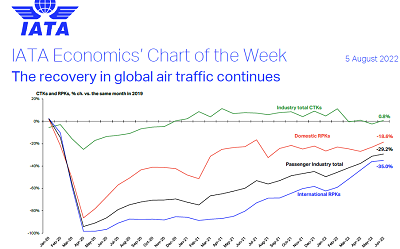How the weak eurois affecting European travel demand
• Following Russia’s invasion of Ukraine in February, and a slow start to the European Central Bank’s (ECB) monetary policy tightening in July, the euro has depreciated by nearly 14% year-to-date against the US dollar, as per 14 October, while losing a more modest 3% on an inflation-adjusted and trade-weighted basis versus all its trading partners (see charts above).
The greater loss of purchasing power against the US dollar has dampened travel demand from the euro area to the US (Panel A), and to a more limited extent also bookings to the rest of the world (Panel B). • Panel A shows air ticket bookings from the euro area to the US in blue, and from the US to the euro area in orange, in percent of 2019 bookings.
Bookings in both directions started the year in 2022 at an equal 40% of 2019 bookings. Both recovered with strong momentum in the first quarter as more people were vaccinated and more travel restrictions were lifted. By mid-April, bookings in both directions had reached the 100% line, representing full recovery compared to pre-pandemic levels.
• Since then, bookings from the US to the euro area have remained at and above pre-pandemic levels, while bookings in the opposite direction retreated in line with the continued weakening of the euro against the dollar, and the euro reached a two decades low of 0.96 dollars per euro on 27 September. Clearly, US travelers are benefiting from the strength of their currency, as opposed to the Europeans who are now exhibiting greater price sensitivity in their bookings given their exchange-rate disadvantage.
• The euro is certainly not the only currency to lose out against the US dollar – the Japanese yen has reached its lowest level since 1999 versus the greenback, and the British pound hit a new all-time low in September, just to name a few. As a result, the euro’s depreciation is almost negligible against a basket of peer currencies (Panel B). Bookings by European travelers to the rest of the world saw a rapid recovery from 40% to 96% of pre-pandemic levels between January and April, as travel restrictions were lifted.
In April, bookings pulled back in parallel with the euro depreciating by 2.5% in the single month of April on this trade-weighted basis. Since the ECB started raising interest rates in July, the euro has recovered somewhat and bookings from the euro area to the rest of the world have stabilized at around 76% of pre-pandemic levels as of mid-October.
